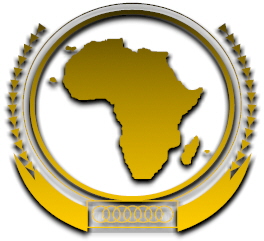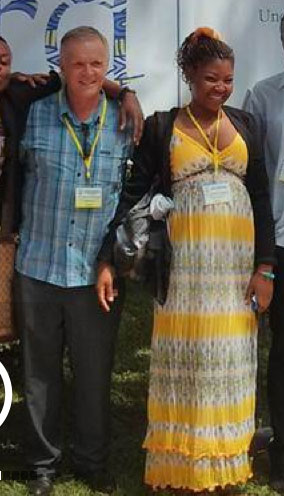Waiting to hear if hard work pays off at African Commission
Colin Stewart is a 45-year journalism veteran living in Southern…
The second of a series of dispatches by the Rev. Canon Albert Ogle on efforts to protect human rights of LGBT people by working with the African Commission for Human and Peoples’ Rights, currently meeting in the Gambia, West Africa.
This is an edited version of Ogle’s column of Oct. 25, 2013, from the San Diego Gay and Lesbian News:
Important conversations on LGBT rights in Africa come to an end

As the public part of the African Commission on People’s and Human Rights comes to a close today in the Gambia, we await the deliberations and formal adoption of some important resolutions that will positively or negatively impact millions of LGBT Africans and their allies.
The organization of this very impressive gathering is in very capable hands of Madame Hanna Foster and a small and dedicated staff based here in Banjul in the Gambia. The commission is an instrument of the African Union and is the place where civil society and even states can challenge each other for human rights violations, interstate disputes and failure to comply with African Charter and other international treaties.
For LGBT Africans, it is one of the most important forums on the continent where their issues can be heard, alliances and reconciliation created, and hopefully, some of their grievances and fears addressed. It is a highly politicized environment where states are reviewed by their peers and Special Rapporteurs can be sent by the commission into countries to investigate complaints or take these complaints to higher levels where governments can be embarrassed enough that they agree to make changes to their laws and practices to conform to these agreed international standards.

We not only heard about the many examples of violations, treatment of political opposition members or lack of freedom of the press, but we also heard about simple problems like a failure to get a response from a state because the email address of the person responsible for these issues had changed or the commission only had five legal researchers when the African Union budget had promised 15. With all the strains and imperfections, the meetings of first, the Civil Society organizations followed by a formal gathering of the commission was a candid and open discussion of a dynamic continent seeking to build a multicultural, tolerant, just and economically vibrant Africa.
For several years, the African LGBT community (preferring the name SOGI, or Sexual Orientation and Gender Identity) has been making progress with the 11 elected members of the commission and the 38 African states where homosexuality is still taboo, illegal and extremely misunderstood.
International organizations including AMSHeR (African Men for Sexual Health and Rights), Human Rights Watch, the American Bar Association (interested in human rights abuses in Darfur, for example), Robert F. Kennedy Center, IGLHRC and this year, the San Diego-based St. Paul’s Foundation, can participate in an NGO Forum in advance of the commission’s meetings, share there in interest group discussions, and make recommendations and resolutions that are to be considered in the commission itself.
The public meetings of the commission end today and they will be meeting in private session through Nov. 5, so resolutions remain confidential. Any that are approved are then fed to the heads of state to be discussed and acted upon. The strength of this process lies in the fact that all of the difficult issues are on public record and each country has to live with its own profile, including those with well documented human rights abuses.
These public documents of the African Union can also influence a country’s standing with the United Nations and the World Bank, so we saw government delegations from places like Cameroon where the Justice Minister and a cadre of diplomatic staff are assigned to publicly respond to criticism and a possible international visit from the commission itself to further investigate human rights abuses.

The Cameroonian situation and broad human rights abuses, LGBT persecution and the treatment of prisoners, for example, were addressed eloquently by Patience Ngo Mbeh of REDHAC, a human-rights defender organization in Douala, Cameroon. At the podium, she spoke on behalf of several LGBT organizations from that nation, who were also hoping to address the conference. But because of time constraints, a possible 20-minute SOGI presentation was reduced to three minutes from this straight ally.
 The other powerful image of this straight ally addressing the well-documented persecution and imprisonment of LGBT people and human-rights activists was that she was very pregnant. Her son will be born in the next 10 days, so we were all impressed by her commitment to fly here and to represent all human-rights defenders including LGBT. Patience was one of two people sponsored by [Ogle’s own] St. Paul’s Foundation for International Reconciliation, the Advocates for Human Rights, ADEFHO, CAMFAIDS and international supporters. A Shadow Report was prepared and shared with commissioners and delegates as well as a very powerful official statement from REDHAC itself (Le Réseau des Défenseurs des Droits Humains en Afrique Centrale). Copies of the statement are also available online.
The other powerful image of this straight ally addressing the well-documented persecution and imprisonment of LGBT people and human-rights activists was that she was very pregnant. Her son will be born in the next 10 days, so we were all impressed by her commitment to fly here and to represent all human-rights defenders including LGBT. Patience was one of two people sponsored by [Ogle’s own] St. Paul’s Foundation for International Reconciliation, the Advocates for Human Rights, ADEFHO, CAMFAIDS and international supporters. A Shadow Report was prepared and shared with commissioners and delegates as well as a very powerful official statement from REDHAC itself (Le Réseau des Défenseurs des Droits Humains en Afrique Centrale). Copies of the statement are also available online.
It was an honor to live and work closely with these wonderful human rights defenders and the six representatives from Cameroon worked extremely hard to tell their stories, speak with government and Commission representatives and network among other NGOs. One of the weaknesses in the current African network on SOGI and ally organizations was a robust Francophone program. One SOGI representative from Burkina Faso looked at ways the Francophone community could catch up with the progress made in English-speaking countries, so last night and this morning several important discussions took place at our hotel, led by the Cameroonian delegation. They hope to establish a common Internet platform to share information, translate a lot of great resources into French for each other and have a robust French-speaking presence at the 2014 International AIDS Conference in Australia.
So today, as we prepare to depart, we are hopeful that the hard work of the past 10 days will pay off and the commission will move toward helping to repair the human rights abuses in Cameroon and elsewhere in Africa and beginning a process of engagement and dialogue on the needs for protection, security, access to health and legal services for all citizens. We will not know for several weeks if our work will bear fruit in the way we would hope.
This is an edited version of commentary that originally appeared in the San Diego Gay and Lesbian News.
Related articles
- Steps toward LGBT equality via D.C., Rome, the Gambia (76crimes.com)
- Report: Anti-gay laws harm African economies (76crimes.com)
- Africans seek protection for LGBT Africans, and you can help (76crimes.com)
- Much talk, a little action on LGBT rights worldwide (76crimes.com)
- ‘Too little international outcry when LGBT champions are killed’ (76crimes.com)


In Africa, for once, free debate on LGBT issues, much more